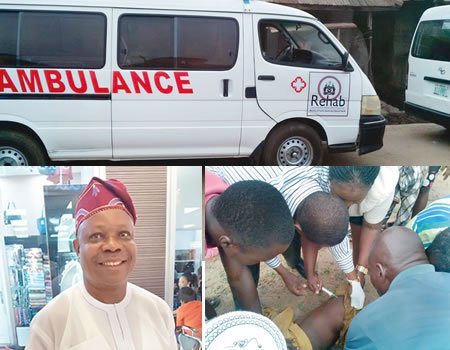
O’Rehab: A New Life For Roaming Psychotics in Osun
The general belief that people suffering from mental imbalance cannot be completely healed has been proved to be a fallacy with the complete cure and rehabilitation of over 160 vagrant psychotics under the O’Rehab scheme. YEJIDE GBENGA-OGUNDARE writes on the life at the rehabilitation centre in Ilobu, Osun State and the new life of inmates that graduate after being cured.

A popular mentally imbalanced man known as Baba Sogo in Ile Ife had been on the streets due to psychotic disorder for 30 years before he was taken off the streets for treatment and rehabilitation. Today, he has been integrated into the society and is living a new life.
On the night of December 24, 2016, the governor of the Osun State, Rauf Aregbesola on his way from the Iwude festival in Ilesa, noticed a young woman who had mental disorder and a broken leg and had been roaming the streets at Isona community. He instructed that she be taken her off the streets that night and given proper care.
Today, the lady had regained her senses. And though she’s still on admission at LAUTECH Teaching Hospital in Osogbo, she conversed intelligently with Nigerian Tribune and the search for her family is on so she can be handed over to them after rehabilitation to prevent a relapse.
62-year-old Fatunmise (last name withheld), a graduate of political science with second class upper was retrieved from the streets of Ile Ife in August 2012, after being psychotic for 11 years. He was admitted to the Obafemi Awolowo University Teaching Hospital under the O Rehab scheme and discharged in March 2013 after which he was re-united with his family.
64 years old Madam Funmilayo (last name withheld), was equally psychotic for seven years after being deported from the United States of America. She was a common feature along Okefia in Osogbo where she was retrieved and treated at the General Hospital, Asubiaro on November 7, 2013 and discharged in May 2014.
These are few of the over 160 pyschotic vagrants that were given a new lease of life by the O’Rehab Scheme, an initiative of Ogbeni Rauf Aregbesola, the governor of the state of Osun.
The scheme started in November 2011 as a project under the Ministry of Youth, Sports and Special needs under the supervision of Comrade Biyi Odunlade.
The team works in professional partnership with a special psychotic treatment foundation – Care and Foundation for Mentally Ill Persons (Caremi foundation), founded by Professor Rogers Makanjuola, though funding for O Rehab is solely by the state government.
According to Odunlade, some of the destitute are repatriated mainly from Lagos and other states as 90 per cent of psychotic patients treated under the scheme were dumped in the state or they trekked down from other states, adding that treatment takes an average of six weeks before rehabilitation and reintegration into the society while they still undergo medical checkups for a while to forestall a relapse.
“When we are informed that there’s a case somewhere, we go and take the person off the streets after which they are taken for treatment in the hospital then sent to the rehabilitation center to acquire vocational training and given startup capital before reintegration into the society through their families.
“The government spends between N250, 000 to N300, 000 for the treatment of individual patients and an additional N100, 000 to N200, 000 when they are graduating from the rehab center as startup capital,” Odunlade stated.
He however confirmed that there are rare cases of relapse after treatment, adding that the rate is not up to one per cent of patients treated under the scheme, stating that only three of the over 160 people treated experienced relapse which were triggered by further emotional trauma after they were handed over to their families. The three cases he said include that of a 35-year-old female civil servant named Biodun that was rehabilitated by the scheme after suffering mental breakdown for seven years and handed over to her brother in 2015; she suffered a relapse and was taken back for treatment.
Another case is that of 39 years old Kikelomo, an unemployed Ordinary National Diploma certificate holder that was picked in Osogbo after five years on the streets and handed over to her mother but was taken back after relapse and Sakirat, a 32-year-old tailor that was psychotic for nine years before being handed over to her mother and is presently being monitored by the scheme after a relapse.
The Ilobu rehab center of the scheme trains healed patients on diverse vocational skills like soap making, bead making, tailoring, hair dressing and various crafts after they would have been treated at one of the five hospitals used by the scheme; Ladoke Akintola University of Technology teaching hospital, Obafemi Awolowo University teaching hospital, Yaba Psychiatric Hospital, Aro Psychiatric Hospital in Abeokuta and Government Hospital, Asubiaro, depending on the nature of the psychiatric disorder .
Odunlade, however, stressed that most mentally imbalanced people are merely suffering from a form of trauma and most times only require love, attention and counseling with medication and supervision, adding that chaining them or beating them as is done in traditional healing homes will only aggravate their situation.
A relative of one of the rehabilitated patients who spoke to Nigerian Tribune on the condition of anonymity stated that her brother’s case was immediately taken over before his condition worsened.
“We do not have a history of mental disorder in my family, but on January 14, 2016, we learnt Abayomi who works for the government mentally broke down while at work but luckily for us, his colleagues quickly called operators of the scheme and he was taken from work to OAU. He was discharged on February 19, 2016.
“After his discharge, he was handed over to our elder brother and a director in his ministry. He has since gone back to work and has not suffered any disorder or relapse. In fact, we used to monitor him a lot but we were told by the rehab people to treat him like we normally do and we are sure that he is completely okay,” she said.
Speaking further, Odunlade stated that “Our process is hinged on what we call the four Rs: retrieval, rehabilitation, repatriation and re-integration. We have a chain of persons that go to the streets to pickup psychotic vagrants using technical strategies, this is called retrieval. You see, not everyone you see on the streets wearing tattered or dirty clothes are deranged. Our focus is on vagrant psychotics; these are people with schizophrenia, depression or any kind of disorder and distortion in relationship or dressing. These people do not have homes; they just go about and constitute diverse forms of threat to humanity. So we go after them and pick them up then decide which hospital best suits their needs out of the hospitals we partner with – LAUTECH, OAU, Yaba, Aro and our state hospital in Osogbo where we employed a consultant psychiatrist specifically for the scheme to set up a psychiatric clinic in the hospital.
“The next thing is treatment which we call rehabilitation. During treatment, we start looking for family members of the affected patient, we call this home tracing because when they are well, we ensure they are handed over to a close family member.
“Aside the case in LAUTECH, we presently have the case of a 29-year-old female lawyer who after law school and service, developed a mental challenge and we picked her up, it was during rehabilitation that we discovered that she is the daughter of a renowned person in the society but we can’t mention names. The father showed up and said it was when her trouble became too enormous and she became a threat to them that he abandoned her to her helpless mother who took her to churches where she was chained and which aggravated her condition. The moment you manacle, chain or beat someone with disorders as is done in traditional healing homes, their situation becomes worse.”
Odunlade, however, cited some of the challenges of the scheme. According to him, “We have different kinds of constraints. The programme started from a point of disbelief with people expressing doubt that anyone could be completely healed. The second challenge is stigmatisation. This stigmatisation and disbelief have pervaded the system and is a problem but there’s a need to re-orientate people about this. The third challenge which affects every aspect of the programme is paucity of funds. To treat an average person costs the government between N250, 000 to N300, 000 and can be more. If the government uses this to treat one person, you can multiply it by how many people we have treated to know how much has been pumped into this setup over time and no hospital admits any psychotic patient without down payment or discharges them without full payment.”



